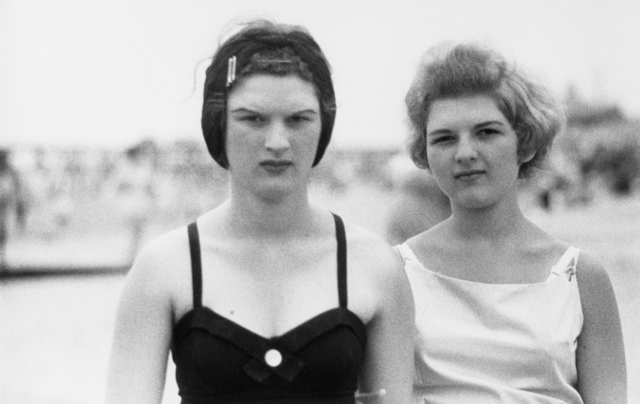Research 9/30-10/7: Dianne Arbus, Cindy Sherman, The Illusionist, Connie Fisher on Makeup,
- Valeria Crolla

- Oct 4, 2020
- 4 min read
Updated: Oct 6, 2020
Musilli J., 1972, Master of Photography: Dianne Arbus, https://www.youtube.com/watch?v=Q_0sQI90kYI

Dianne Arbus (1923-1971) is American portrait photographer that is best known for her fascination with the common place. Her subjects are people that often have been discriminated on in society and been through some form of tragedy they needed to overcome. Through her photos, she shows people who may be described as "freaks". Instead of looking away like much of society has, she looks at them in a humanly way. Arbus believes that when it comes to photography, the subject is more important that the actual photo. The experience of learning about one's subject, listening to their stories, and narrating their lives through photographs is most valuable part. She believes the camera is a license to learn about others and explore their homes.
The reason Dianne Arbus particularly stuck out to me is because her photos engage in the concept of understanding the gap between intention and effect. She notes that we have a guise that we portray to the world in order for it to think of us in a certain way. With her work, she is able to examine up close someone's perceived flaws and begin to cross the limit of what one wants people to know and what one cannot help others knowing about them. Though you can never get out of your own skin and into someone else's skin, the camera is used as a tool to try.

(article) Cindy Sherman in a New Millennium: Fashion, Feminism, Art, and Aging, Paula Church Gibson, 2018
Cindy Sherman (1954) is an American contemporary portrait photographer, exploring topics of identity and representation throughout her work. Sherman takes on not only the role of photographer, but also model, makeup artist, hairdresser, and stylist. She has portrayed herself in a variety of guises that result in powerful and grotesque photographs.
I found Cindy Sherman intriguing because she tackles topics of identity that are not always what we normally discuss. Her work ranges from film stills, where she portrays herself in stereotypical female rolls from 50-60s Hollywood; to some grotesque, disturbing portrayals of women; to aristocrat portraits of women obsessed with their youth. She both explores and distorts the concept of femininity. Even on her Instagram account, Sherman posts images using apps such as Facetune, to distort her selfies in an absurd and uncomfortable ways. In her recent work, the act of aging is something she focuses on, which I found important because the discussion of representation of women often leaves out women over the age of thirty. As I move forward with my project, I believe I can gain a great deal of inspiration from her work.

Rossini E., Franchini E., 2015, The Illusionist, https://theillusionists.org/
The documentary the illusionist explains the globalization of beauty ideals. It points out that multi-billion dollar industries are saturating our lives with images of unattainable beauty mainly targeting women. Advertisers thrive off insecure, anxious, dissatisfied individuals. Constantly, they are trying to sell us ways to reinvent ourselves. The Illusionist critically examines the side to advertising we do not get to see.
Billboards, street ads, TV, film, and video games all greatly influence how we shape our identity. Seeing ads that shout at you for the "flawless look" and "enhance the one only body you have" increase the pressures to fit in to a certain body type. Globalization has made it easier for the ideal image of the Westernized beauty standard to be spread from New York to Tokyo.

Lewis G., Jones D., Davies W., 2016 Connie Fisher and Makeup, https://www.bbc.co.uk/programmes/b075f8xb
Connie Fisher is a British actress and producer interviewing others to understand why women wear makeup. She asked random people in stores, as well beauty bloggers, journalists, and an evolutionary psychologist. Though I've already have been doing some research as to why women wear makeup, this video was pointed out some interesting points that others did not. For instance, Evolutionary Psychologist Lance Workman pointed out that at a subconscious level, women mainly wear makeup to attract men and indicate that they are fertile. Studies have shown when women wear red lipstick on a night out, they are more likely to attract the attention of men than women who don't because men see connect that to the natural red color the lips turn when they women are aroused. Though I believe this argument holds some truth for makeup in history, I think it leaves out the impact that mass-media has on our choices and it seems like a very heterosexual way of thinking.
Another topic worth noting from this documentary is that many women really just wear makeup because it's a pleasurable ritual. Not to impress anyone or communicate any message to anyone, just to look at their selves in the mirror and feel better about themselves. It can be in many ways a coping strategy that a lot of women rely on.
Finally, this video also touched upon the topic of what men thought of when women wear makeup. Though my feminist self tells me to not care at all about their opinion towards a woman's makeup choices, it is important because many times they are a part of the group of others that view us that we keep discussing throughout this topic. Guys interviewed for this video shown to like women with a little bit of makeup on. Too much makeup made them seem "fake" and "artificial" which they did not like. They preferred when a woman looked natural. My main critique of this segment is that only white men that appeared to be between the ages of 20-35 and a few older men were interviewed. Whether this information is significant or not, having a more diverse group of interviewees would make for a more accurate result.


















Comments